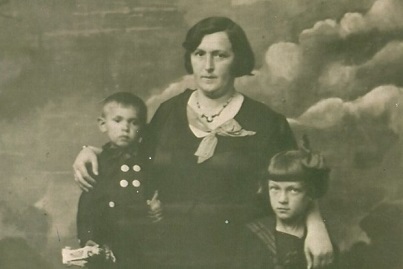Mania Golberg sat in her dining room in Roswell, Georgia; explaining what it was like to hide in a dark underground cave in Ukraine for 344 days during the Holocaust.
The enormity of what Mania lived through seemed somehow misaligned with the frail 85 year old Jewish woman sitting next to me kneading her hands. The longer I listened, the more acutely aware I was of the privileged decade and country to which I was born. I was interviewing Mania for a book I was helping to ghostwrite called Unbroken Woman, about Mania's family's life without daylight. The assignment was a rare gift. Mania's raw connection to her past reminded me why it was an important story to share, more than seventy years later.
We do not read survival stories merely because people physically endure; but to learn from other people's spiritual endurance, to prove to ourselves that if had to contend with such horrors, we would retain the fragile seed of our humanity. There is no time when we need this more than now.
We are living in a precarious decade. The media continues to drill us with footage about beheadings of Americans by ISIS, about Ebola, reminding us that war and disease could be coming to our own soil, that as Americans, we are no longer immune to the troubles of the world. Many people are scarred on a deeply subconscious level by fear, by the prospective uncertainty of what could happen in this country in the future. We often exist in a semi-comatose state. We become like caterpillar larvae stuffing itself with leaves; gorging ourselves with booze, television, pills; as if we are preparing for the day when we may have to go hungry, to protect ourselves by spinning a cocoon.
The afternoon lengthened and Mania had been traversing the dreamlike state between childhood and old age like a tightrope walker. I steered her towards one of her more harrowing stories that took place just before they went underground -- when she and her brother Dunia struggled as young children to flip the bodies of dead women massacred by a river they thought was their mother. Vague details came back to me: the crows picking over the corpses, the waterlogged faces, the thin suspicious silence.
What we fail to see is that change is never entirely destructive. Etcia Goldberg's story was delivered to me by her Grandson Valeriy, who had brought to my hotel in Georgia 400 handwritten pages filled with stories his Granny told him at her kitchen table in Borschow, Ukraine. His voice trembled as he translated each page aloud.
I did originally have some doubts about bringing "another Holocaust story" to market. The more Valeriy spoke, however, the more entranced I was. Valeriy's story revealed his Granny's heroic struggles to keep her children from starving and freezing; and also her efforts to keep their minds active through storytelling. Despite the circumstances, she managed to fall in love with a Ukranian man who saved Jewish lives.
I remembered an article I read in Time Magazine in 1991, about Terry Anderson, after he was by the Islamic Hezbollah militants in Lebanon after seven years during the Iran/Lebanon hostage crisis. I became haunted, not by the way Anderson was tortured, but by the things that he did to keep his mind active during the ordeal -- including walking through familiar streets of his town, remembering his family's features, and setting up a future farm in upstate NY for inner city kids. I was 17 years old and promptly began building up my mind by memorizing poems so that if something like that happened to me, I would have the strength to continue to live.
The longer Valeriy read, the more his Granny's story resonated with that memory. Etcia was resilient. She drew upon strong inner resources to keep from giving into despair -- telling her children stories about their homeland, celebrating their birthdays, speaking of dreams for the future. She loved them ferociously, laying down her life for them again and again.
In a suburban dining room in Roswell, Georgia, that love resonated in Mania's words.
"We were afraid Momma wouldn't come back," she said in Ukranian. She sunk into her chair, becoming the terrified 15 year old girl huddled in the dark cave. Her blue eyes filled with tears as she returned to her candlelit place in the story, where the children waited for their mother to return from a night gathering food. There was a strong chance she would be murdered above ground before she returned.
When I later interviewed Mania's brothers Marek and Dunia, they also honed in on that point in the story and cried talking about those long hours.
Mania's papery hands squeezed my bare arm. She speared some more Ukranian sausage onto my plate, hoping I would understand the magnitude of what she was telling me. I nodded my head, chewed my food slowly. I knew I had a responsibility to do my best to help share this story while Etcia's children are still alive.
For more info about the book please visit our campaign http://bit.ly/etcia

